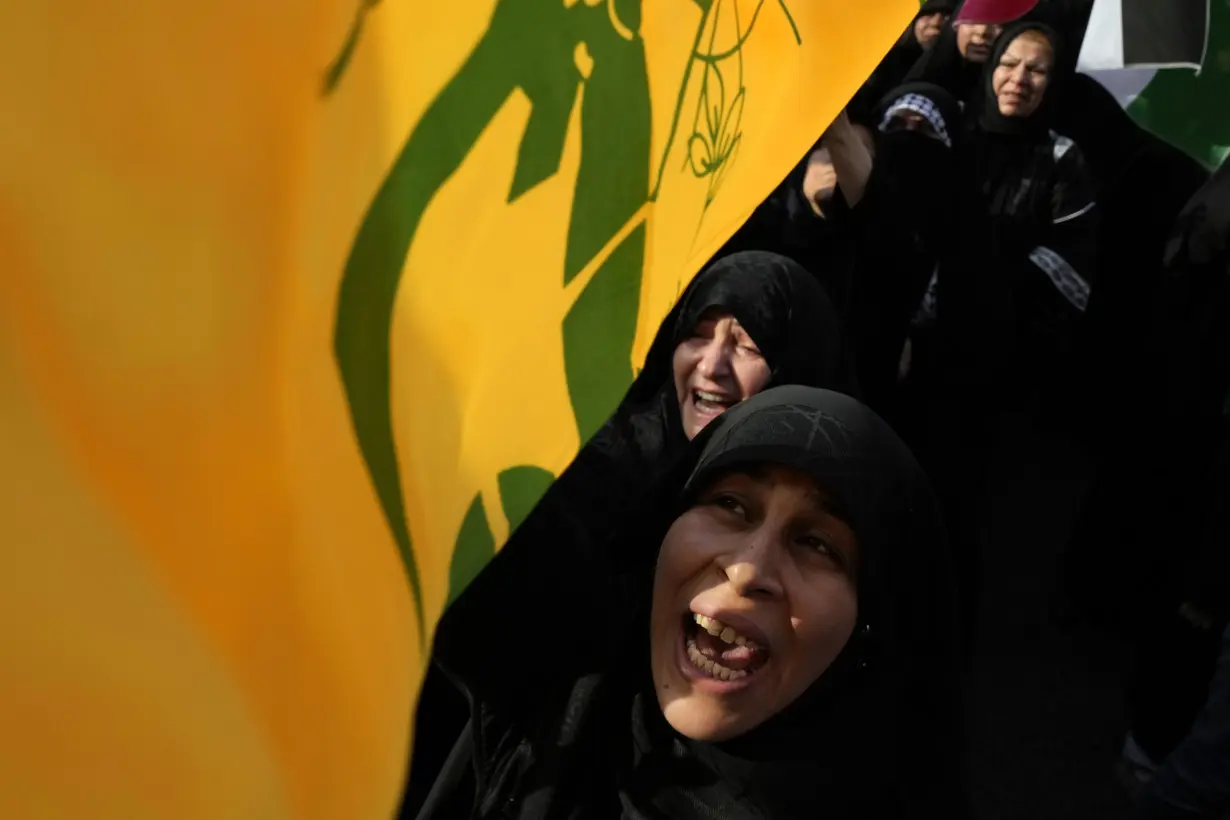Hamas leader Ismail Haniyeh was assassinated in Tehran, Iran’s paramilitary Revolutionary Guard said early Wednesday. No one immediately claimed responsibility but suspicion quickly fell on Israel, which has vowed to kill Haniyeh and other Hamas leaders over the group’s Oct. 7 attack on Israel that sparked the war in Gaza.
Haniyeh was in Tehran to attend Iranian President Masoud Pezeshkian’s swearing-in ceremony on Tuesday. He was killed hours later by a predawn airstrike, which Iran says is under investigation. The country’s supreme leader has vowed revenge against Israel.
Israel carried out a strike in Lebanon on Tuesday that it said killed Fouad Shukur, a top Hezbollah military commander whom the United States blames for planning and launching the deadly 1983 Marine bombing in the Lebanese capital. Hezbollah confirmed the death Wednesday.
Haniyeh left the Gaza Strip in 2019 and had lived in exile in Qatar. The top Hamas leader in Gaza is Yahya Sinwar, who masterminded the Oct. 7 attack.
Haniyeh's killing comes at a precarious time. U.S. President Joe Biden’s administration has tried to push Hamas and Israel to agree to at least a temporary cease-fire and hostage release deal for the Israel-Hamas war. Senior officials from the U.S., Israel, Qatar and Egypt were set to meet for the latest round of talks.
Here’s the latest:
SYDNEY — Australia’s Prime Minister Anthony Albanese urged thousands of Australian citizens in Lebanon to leave and warned Thursday that the Beirut airport could soon close.
“I take the opportunity to say to Australians: Do not travel to Lebanon at the moment,” Albanese told reporters in Sydney.
“There is a risk that the Beirut airport might not be open for commercial flights and given the numbers of people who are there, there’s no guarantee that we can just guarantee that people will be able to come home through other means if that airport is shut.”
Albanese said he was “very concerned” that conflict in the Middle East would escalate following the killing of Hamas leader Ismail Haniyeh in Iran.
“We want to see a de-escalation, we want to see a cease-fire, we want to see the hostages released and we want to see a plan for peace and security in the Middle East where both Israelis and Palestinians can live in peace and security with prosperity,” Albanese said.
UNITED NATIONS — Iran and Israel each pressed the U.N. Security Council to condemn the other after airstrikes killed two anti-Israel militant leaders in Iran and Lebanon and raised concerns that a regional war could erupt.
But the U.N.’s most powerful body issued no collective message after Wednesday’s emergency meeting. The 15 members variously warned that the Middle East was at a precarious point, worried about potential escalation, called for restraint and diplomacy, and pointed fingers along longstanding fault lines.
Iran blames Israel for the killings of Hamas’ political chief, Ismail Haniyeh, in Iran and of a top Hezbollah commander in Lebanon. Israel acknowledges the Lebanon strike, saying the target was behind a weekend rocket attack that killed 12 young people in the Israeli-controlled Golan Heights, but Israel has been silent on Haniyeh’s death.
Iranian Ambassador Amir Saeid Iravani urged the council to hold Israel accountable and consider sanctions. He underscored that his country reserved the right to “respond decisively to this terrorist and criminal act” when “necessary and appropriate.”
Israeli Deputy Ambassador Jonathan Miller exhorted the council to condemn Iran and increase sanctions on a country he called “the engine driving the machinery of death and destruction” through support for such groups as Hamas and Hezbollah.
Lebanese Ambassador Hadi Hachem accused Israel of trying to kindle a region-wide conflict. He implored the council “to take a firm stand before it is too late.”
UNITED NATIONS — The U.N. Security Council is holding an emergency meeting after a set of airstrikes hours apart killed two anti-Israel militant leaders in the Middle East, raising concerns that a regional war could erupt.
The killings of Hamas’ political chief, Ismail Haniyeh, in Iran and of a top Hezbollah commander in Lebanon have stirred a diplomatic scramble at the U.N. and elsewhere to try to contain the complex, mounting tensions in the region.
“The various attacks over the past few days represent a serious and dangerous escalation,” U.N. Undersecretary-General Rosemary DiCarlo said as the council meeting began Wednesday. She called for diplomatic efforts “to change the trajectory and seek a path toward regional peace and stability.”
It appears unlikely that the Security Council can coalesce around any joint message on the airstrikes. The United States, a key ally of Israel, and Russia, which has close ties with Iran, are both council members with veto power.
BEIRUT — The United States State Department is raising Lebanon’s travel advisory, calling on its citizens to no visit the country.
Wednesday's announcement comes a day after an Israeli drone strike killed a top Hezbollah commander in a rare Beirut strike shortly followed by a strike in Iran that killed Hamas leader Ismail Haniyeh.
Politicians and diplomats fear that Hezbollah and Iran’s retaliatory strikes could spark an all-out war away from the delicate rules of engagement that limited strikes to mostly areas near the Lebanon-Israel border.
Since Hezbollah and Israeli troops started clashing on Oct. 8, the U.S. has urged its citizens to reconsider traveling to the tiny Mediterranean country.
UNITED NATIONS — The U.N. Security Council will hold an emergency meeting Wednesday after an airstrike killed Hamas political leader Ismail Haniyeh in Tehran, and the U.N.’s top leader is pressing world nations to come together quickly to keep Mideast tensions from boiling over.
Secretary-General António Guterres sees the strike in Tehran and another in the Lebanese capital of Beirut as “a dangerous escalation,” spokesperson Stéphane Dujarric said at a briefing.
He reiterated calls for de-escalation and said Guterres is urging the international community “to work together to urgently prevent any actions that could push the Middle East over the edge, with a devastating impact on civilians.”
The Security Council meeting was scheduled after Iran pressed the U.N.’s most powerful body to address “Israeli aggression and terrorist attacks.”
ANKARA, Turkey — Turkey’s Parliament speaker is condemning the assassination of Hamas chief Ismail Haniyeh and urging the international community to halt Israel’s actions.
In an interview with the Associated Press, Numan Kurtulmus also expressed concerns that the conflict in Gaza could escalate into a “global conflict” if a fair peace agreement is not reached.
“Israeli government’s lack of restraint, its excessive and reckless conduct, and its ongoing aggressive actions pose a threat to all nations globally,” Kurtulmus stated. “It is imperative for all countries, institutions, and organizations to intervene against this aggression, as it endangers the safety of capitals worldwide.”
Kurtulmus added that “endless support” granted by Western nations, and especially the United States, had emboldened Israeli Prime Minister Benjamin Netanyahu.
ROME — Italy, which holds the rotating G7 presidency, is calling for moderation after Hamas political leader Ismail Haniyeh was killed. It's also reiterating its support for U.S. President Joe Biden’s three-phase, hostage-for-truce plan for Gaza.
“We absolutely do not want the Middle East to plunge into open war. It is not the interest of the peoples of the region, it is not in the interest of anyone,” Foreign Minister Antonio Tajani told the lower chamber of Parliament.
“I call for everything possible to be done to avoid an escalation,” he said.
The right-wing government of Premier Giorgia Meloni is a top Israeli ally but has also mobilized a humanitarian response for Gaza that has involved evacuating 150 Palestinians and an aid delivery program.
JERUSALEM — Al-Jazeera said two of its reporters were killed in an Israeli strike in northern Gaza on Wednesday, the latest Palestinian journalists working with the Qatari network to be killed in the enclave.
Correspondent Ismail al-Ghoul, cameraman Rami al-Rifi and a child were killed in a blast that struck a car the trio were traveling in in Gaza City, according to the network and the Emergency and Ambulance Service, which helps recover and transport casualties to hospitals
The two journalists were reporting at the Shati urban refugee camp, the birthplace of Hamas leader Ismail Haniyeh, who was killed in a strike while he was in Tehran, Iran.
The Israeli army has not immediately commented on the journalists' deaths.
According to the Committee to Protect Journalists, 111 journalists, including 106 Palestinians, have been killed since the Israel-Hamas war erupted in October.
The Israeli government shut down Al-Jazeera in Israel in May through a new law that enables it to close down media outlets that are deemed a security threat.
Al-Jazeera, a pro-Palestinian news channel, has accused Israel of targeting its journalists throughout the conflict. In December, Samer Abudaqa, one of the network’s cameramen was killed in a strike. Wael Dahdouh, the outlet’s bureau chief in Gaza, was reporting in late October when he received word on air that his wife, daughter, a son and grandchild were killed in an Israeli airstrike. In January, a strike killed another of his sons, who was also working for Al-Jazeera.
UNITED NATIONS — Iran is asking the U.N. Security Council to hold an emergency meeting to address “Israeli aggression and terrorist attacks” after the killing of Haniyeh in Tehran and the targeting of a top Hezbollah commander in the Lebanese capital.
Iranian U.N. Ambassador Amir Saeid Iravani in a letter on Wednesday blamed both strikes on Israel. He and said they “suggest an intention to escalate conflict and expand the war through the entire region.” He called on the international community for “decisive action to address these violations and hold the perpetrators accountable.”
Israel has taken responsibility for the strike in Beirut, saying it killed a top Hezbollah commander. But Israel has been silent about the strike that killed Haniyeh, though it had vowed to kill him and other Hamas leaders over the group’s Oct. 7 attack that sparked the war in Gaza.
BEIRUT — Lebanon’s Health Ministry says the death toll of an Israeli attack on Tuesday in southern Beirut has risen to five civilians.
Israel said the attack targeted top Hezbollah commander Fouad Shukur, who it blamed for the weekend rocket attack that killed 12 youths in the Israeli-controlled Golan Heights.
Hezbollah said Shukur was in the targeted building, but civil defense workers were still searching for him under the rubble. The five civilians killed were two children and three women. Many more were wounded.
RAMALLAH, West Bank — Hamas’ military wing says the West Bank city of Hebron will remain a “focal point” for its activities after announcing two attacks near the southern city that it called retaliation for the killing of Hamas leader Ismail Haniyeh.
According to the Israeli army, a militant in a car opened fire at an Israeli citizen northeast of Hebron before leaving the vehicle and stabbing the person, who was taken to a hospital. The attacker remains at large, the army said.
The Hebron branch of the Hamas military wing said another attack took place near the Ibrahimi Mosque in the heart of the city. The Israeli army said it had no information on that.
Violence across the occupied West Bank has flared since the Israel-Hamas war erupted in October.
Israeli Foreign Minister Israel Katz has sent a letter to dozens of foreign ministries around the world saying that “Israel is not interested in an all-out war, but the only way to prevent it is the immediate implementation of (United Nations Security Council) Resolution 1701.” That resolution calls for a full cessation of hostilities along the Israel-Lebanon border and a demilitarized zone.
Katz writes that with Israel’s killing of a top commander in Iran’s ally Hezbollah on Beirut on Tuesday, “Israel sent a clear message: we will harm with great force whoever harms us.”
Israel has kept silent on the killing of Hamas leader Ismail Haniyeh in an airstrike in the Iranian capital, which Hamas and Iran have blamed on Israel.
U.S. Secretary of State Antony Blinken has spoken with the prime minister of Qatar, a key mediator in cease-fire talks for Gaza. The State Department says Blinken “emphasized the importance of continuing to work to reach a cease-fire to the conflict in Gaza that would secure the release of hostages, alleviate the suffering of the Palestinian people and unlock the possibility of broader stability.”
Blinken also said the U.S. would keep working to ensure a deal is reached in the 10-month war.
Concerns about cease-fire negotiations have soared in the hours after the killing of Hamas’ top political leader, Ismail Haniyeh. Hamas has blamed Israel and could pull out of the negotiations. Hamas’ top political officials were previously based in Qatar.
SINGAPORE — U.S. Secretary of State Antony Blinken says the United States had not been aware of and had no involvement in the killing of Hamas leader Ismail Haniyeh in Tehran. Both Hamas and Iran have blamed it on Israel.
Blinken declined to speculate on the impact Haniyeh’s death would have on efforts to secure a cease-fire in Gaza between Israel and Hamas. But he said it made it more important to reach a deal to ease the suffering of civilians, free hostages held by Hamas and prevent the conflict from escalating.
“First, this is something we were not aware of or involved in,” Blinken said in an interview with Channel News Asia, according to a transcript provided by the State Department. “I’ve learned over many years never to speculate on the impact that an event has had on something else. So I can’t tell you what this means,” Blinken added.
DEIR AL-BALAH, Gaza — War-weary Palestinians in Gaza are mourning the killing of Hamas political leader Ismail Haniyeh. Some say it will complicate efforts to reach a cease-fire deal with Israel.
“This man could have signed the prisoner exchange deal with the Israelis,” said Saleh al-Shannar, who was displaced from his home in northern Gaza. “Why did they kill him? They killed peace, not Ismail Haniyeh.”
Nour Abu Salam, a displaced woman, said the killing shows that Israel doesn’t want to end the war and establish peace in the region. “By assassinating Haniyeh, they are destroying everything,” she said.
And hundreds of Palestinian demonstrators have marched through Ramallah in the occupied West Bank in protest against the killing. They carried dozens of green Hamas flags and chanted, “The people want al-Qassem Brigade,” a reference to the militant group’s military wing.
Open support in Ramallah for Hamas is rare. Ramallah is the administrative capital of the West Bank and is governed by the Fatah-dominated Palestinian Authority, long at odds with Hamas over the governance of the two Palestinian territories.
TEHRAN, Iran — Iran’s Supreme Leader Ayatollah Ali Khamenei on Wednesday vowed revenge on Israel over the killing of Hamas’ political chief.
Khamenei said Israel “prepared a harsh punishment for itself” after Ismail Haniyeh was killed in a predawn airstrike in the Iranian capital Tehran.
“We consider his revenge as our duty,” Khamenei said in a statement on his official website, saying Haniyeh was ”a dear guest in our home.”
Turkish President Recep Tayyip Erdogan denounced Hamas political chief Ismail Haniyeh’s killing Wednesday as a “despicable act” aimed at undermining the Palestinian cause and demoralizing and intimidating its people.
In a post on social media platform X, Erdogan said, “Zionist cruelty will never accomplish its objectives.”
“Turkey will continue to try all avenues, force all doors and support our Palestinian brothers with all our means and strength,” Erdogan said. “We will continue to work for the establishment of a free, sovereign and independent State of Palestine based on the 1967 borders, with East Jerusalem as its capital.”
Haniyeh was scheduled to deliver a speech in Turkey’s parliament in August, said Omer Celik, spokesperson for Erdogan’s ruling party.
BEIRUT — Lebanon’s Health Ministry said Wednesday that the death toll of an Israeli attack in southern Beirut rose to four civilians, as the United Nations expressed concern of further escalation.
Israel said the attack Tuesday targeted top Hezbollah commander Fuad Shukur, whom they accused of launching a rocket on Majdal Shams in the Israeli-annexed Golan Heights that killed 12 youths.
Hezbollah said that Shukur was in the targeted building during the Israeli strike, but civil defense workers were still searching for him under the rubble. The four killed included two children and two women, and many more were wounded.
The strike hit deep into Lebanon, near the capital, stoking fears of the tense skirmishes turning into an all-out war and sparking regional conflict. Residents in the Beirut southern suburb of Haret Hreik told The Associated Press that they heard two strikes that they suspected was a drone attack.
A delegation of Lebanese government ministers visited the site of the attack. U.N. Secretary-General Antonio Guterres' spokesperson Stéphane Dujarric expressed “grave concern” over the strikes in the densely populated neighborhood.
“As we await further clarity on the circumstances, we again urge the parties to exercise maximum restraint and call on all concerned to avoid any further escalation,” said Dujarric.
Hezbollah and Israel began exchanging fire along the tense Lebanon-Israel border almost daily since the latest Israel-Hamas war began.
— The item above has been corrected to reflect that the day of the attack was Tuesday, instead of Wednesday.
BEIJING — China said it condemns the assassination of Haniyeh, and said it was concerned that the leader’s death would lead to further tensions in the region.
“We firmly oppose and condemn the act of assassination. We are deeply concerned that this incident may lead to escalation and turbulence in the region,” said Ministry of Foreign Affairs spokesperson Lin Jian at a daily briefing Wednesday.
“China has always advocated resolving regional disputes through negotiations and dialogues. The Gaza Strip should achieve a comprehensive and permanent cease-fire as soon as possible to avoid further escalation of conflicts and confrontations.”
China served as a mediator between Hamas and Fatah and had gathered the two Palestinian factions together in Beijing last Tuesday to sign an agreement to form a government together after the war. Beijing increasingly has influence in the Middle East and is playing an active role in diplomacy in the region.
TEHRAN, Iran — Iran’s President Masoud Pezeshkian condemned the killing of Hamas leader Ismail Haniyeh in Tehran on Wednesday.
He said in a post on the X platform that his country will defend its territorial integrity and make those responsible regret their actions. He ended the post with a Quran verse, saying “The God is all powerful and capable of revenge.”
Hamas has blamed Israel, which has declined to comment.
Haniyeh attended the Pezeshkian's swearing-in ceremony Tuesday, along with other Hamas officials and officials from Hezbollah and allied groups.
Videos showed that after the ceremony, Pezeshkian hugged Haniyeh and raised his hand while they were laughing.
BEIRUT — Hamas’ regional allies issued condolences and statements of defiance Wednesday in response to the killing of the group’s political leader Ismail Haniyeh in an alleged Israeli strike in Iran.
The Lebanese militant group Hezbollah called Haniyeh a “great and honest leader and dear brother” and extended condolences to his family “who have offered dozens of martyrs from among their men and women on the path to liberating Jerusalem and Palestine.”
Yemen’s Houthi rebels called Haniyeh’s assassination a “major escalation and a greater transgression, and a blatant violation of all international laws, norms and covenants” and said the group is “determined to stand by Hamas and all resistance factions in confronting the American-backed Zionist rampage.”
Palestinian Islamic Jihad, a smaller militant group that has been fighting alongside Hamas in Gaza, said that the “sinful assassination” will “not deter our people from continuing the resistance to put an end to the Zionist criminality that has crossed all limits.”
It remains unclear how Hamas’ allies in the region will respond to the killing, as well as to a separate Israeli strike in Lebanon on Tuesday that appears to have killed a top Hezbollah commander.
CAIRO — Sami Abu Zuhri, a spokesperson for Hamas, said that the killing of the group’s leader, Ismail Haniyeh, won't impact the group, saying that Israel won’t achieve its goals including eradicating the Palestinian.
“The occupation will not succeed in achieving its goals,” he told The Associated Press, adding that Hamas emerged stronger after past crises and assassination of its leaders.
He accused Israel of “spreading chaos and evil” in the region. He called for regional governments to speak out against Israel’s acts, and abandon “the state of silence, because more silence means more chaos.”
GENEVA — The United Nations human rights office issued a report Wednesday saying Palestinian detainees taken by Israeli authorities since the Oct. 7 attacks have faced waterboarding, sleep deprivation, electric shocks and other torture and mistreatment.
The report on detention says Israel’s prison service held more than 9,400 “security detainees” as of the end of June, and some have been held in secret without access to lawyers or respect for their legal rights.
A summary of the report, based on interviews with former detainees and other sources, decries a “staggering” number of detainees and raised concerns about arbitrary detention.
“The testimonies gathered by my office and other entities indicate a range of appalling acts, such as waterboarding and the release of dogs on detainees, amongst other acts, in flagrant violation of international human rights law and international humanitarian law,” said U.N. Human Rights Chief Volker Türk in a statement.
Findings in the report, one of the most extensive of its kind, could be used by International Criminal Court prosecutors who are looking into crimes committed in connection with the Oct. 7 attacks and its aftermath, including Israel’s blistering military campaign that is ongoing in Gaza.
Authors of the report said its content was shared with the Israeli government. The Associated Press has contacted the Israeli diplomatic mission for comment.
MANILA, Philippines — United States Secretary of Defense Lloyd Austin said that even with the events of the past 24 hours, Washington hoped that Israel would be able to come to a diplomatic solution and deescalate the situation.
“I don’t think that war is inevitable,” he told reporters in Manila, Philippines. “I maintain that. I think there’s always room and opportunity for diplomacy, and I’d like to see parties pursue those opportunities.”
He added, however, that the United States has for some time been looking at events on Israel’s border with Lebanon with “concern.”
“Again, we’re going to do everything we can to make sure that we keep things from turning into a broader conflict throughout the region.”
Asked what the U.S. would do if the conflict did escalate into a wider war, Austin reiterated his comments from the previous day that “if Israel is attacked, we certainly will help defend Israel.”
“You saw us do that in April, you can expect to see us do that again,” he said. “But we don’t want to see any of that happen. We’re going to work hard to make sure that … we’re doing things to help take the temperature down and address the issues through diplomatic means.”
BEIRUT — The Lebanese militant group Hezbollah said Wednesday it was still searching for the body of a top commander targeted in an Israeli strike in Beirut.
The Iran-backed group’s first comment after the strike targeting Fouad Shukur came hours after his death Tuesday and followed the overnight strike in Tehran that killed Haniyeh. Hezbollah did not comment about the Hamas leader’s death.
Israel claimed late Tuesday that they had killed Shukur, who they said was behind a rocket attack on Majdal Shams in the Israeli-occupied Golan Heights that killed 12 youths.
Hezbollah said civil defense workers were still searching for his body and others under the rubble of the building Israel struck.
Like most of Hezbollah’s military officials, little is known about Shukur, who was also known as Sayed Mohsen. Washington blames him for planning and staging the truck bombing of a Marine Corps barracks in Beirut that killed 241 American service members in 1983.
The Lebanese Health Ministry said that at least two children and a woman were killed in the attack, while 74 others were wounded.
In the West Bank on Wednesday, the internationally backed Palestinian President Mahmoud Abbas condemned Haniyeh’s killing, calling it a “cowardly act and dangerous development.”
Political factions in the occupied territory called for strikes in protest at the killing.
Senior Palestinian official Hussein al-Sheikh in the West Bank also condemned Haniyeh’s assassination as a “cowardly act.”
“We strongly denounce and condemn the assassination of the head of the Political Bureau, the national leader, Ismail Haniyeh,” the Palestinian Authority’s civil affairs chief wrote on X. “We consider it a cowardly act, this pushes us to remain more steadfast in the face of the occupation, and the necessity of achieving the unity of the Palestinian forces and factions.”
Hamas senior official Moussa Abu Marzouk, meanwhile, said that Haniyeh’s assassination will not go unanswered, Iran’s state-run IRNA news agency reported Wednesday. He also called the assassination a cowardly act.
WASHINGTON — The apparent assassination comes at a precarious time, as United States President Joe Biden's administration has tried to push Hamas and Israel to agree to at least a temporary cease-fire and hostage release deal.
CIA Director Bill Burns was in Rome on Sunday to meet with senior officials from Israel, Qatar and Egypt in the latest round of talks. Separately, Brett McGurk, the White House Coordinator for the Middle East and North Africa, is in the region for talks with U.S. partners.
There was no immediate reaction to the reports of Hamas leader Ismail Haniyeh's assassination from the White House.
TEHRAN, Iran — Hamas leader Ismail Haniyeh was assassinated in Tehran, Iran’s paramilitary Revolutionary Guard said early Wednesday.
No one immediately claimed responsibility for the assassination but suspicion immediately fell on Israel, which has vowed to kill Haniyeh and other leaders of Hamas over the group’s Oct. 7 attack on Israel that killed 1,200 people and saw some 250 others taken hostage.
Haniyeh was in Tehran to attend Iranian President Masoud Pezeshkian’s swearing-in ceremony on Tuesday. Iran gave no details on how Haniyeh was killed, and the Guard said the attack was under investigation.
Haniyeh left the Gaza Strip in 2019 and had lived in exile in Qatar. The top Hamas leader in Gaza is Yahya Sinwar, who masterminded the Oct. 7 attack.
Analysts on Iranian state television immediately began blaming Israel for the attack.
Israel itself did not immediately comment but it often doesn’t when it comes to assassinations carried out by their Mossad intelligence agency.

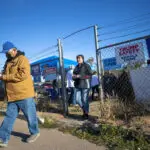 Why AP called Arizona for Trump
Why AP called Arizona for Trump
 Trump wins Arizona, sweeping all seven battleground states, Edison Research says
Trump wins Arizona, sweeping all seven battleground states, Edison Research says
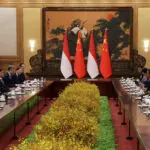 China, Indonesia enhance ties with key deals on lithium, green energy, tourism
China, Indonesia enhance ties with key deals on lithium, green energy, tourism
 King Charles III and Kate will attend remembrance events as both royals slowly return to duty
King Charles III and Kate will attend remembrance events as both royals slowly return to duty
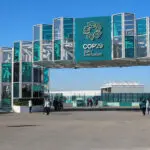 Taliban administration officials to attend UN climate conference in Azerbaijan
Taliban administration officials to attend UN climate conference in Azerbaijan
 Trump has vowed to kill US offshore wind projects. Will he succeed?
Trump has vowed to kill US offshore wind projects. Will he succeed?
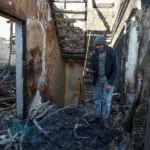 US to speed up interceptor missiles delivery to Ukraine, WSJ reports
US to speed up interceptor missiles delivery to Ukraine, WSJ reports
 Jalen Milroe runs wild as No. 11 Alabama thrashes No. 14 LSU 42-13
Jalen Milroe runs wild as No. 11 Alabama thrashes No. 14 LSU 42-13
 Justin Allgaier wins 1st NASCAR Xfinity title, capping comeback by passing Hill and Custer late
Justin Allgaier wins 1st NASCAR Xfinity title, capping comeback by passing Hill and Custer late
 Evan Mobley scores 23 points and Cavaliers rally past Nets 105-100 to remain perfect at 11-0
Evan Mobley scores 23 points and Cavaliers rally past Nets 105-100 to remain perfect at 11-0
